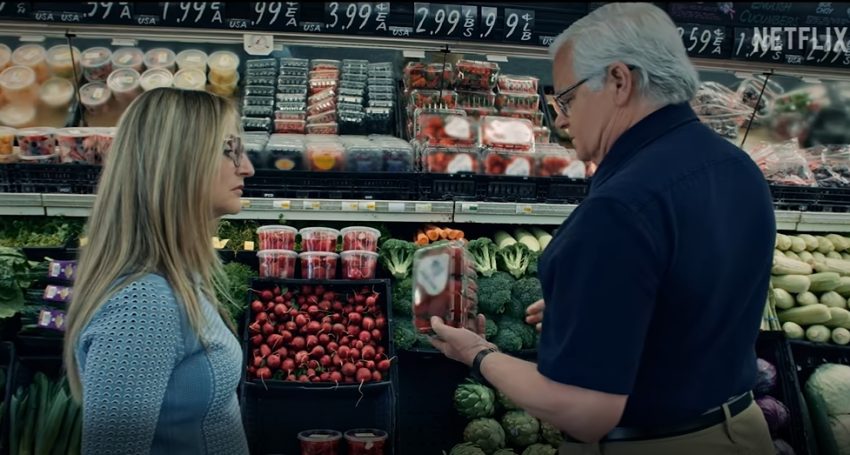Poisoned
Films & TV
“When it comes to food safety and quality, a documentary like Poisoned: The Dirty Truth About Your Food — currently streaming on Netflix — makes you thankful you’re living in Australia rather than America,” says Ben Rogers

When it comes to food safety and quality, a documentary like Poisoned: The Dirty Truth About Your Food — currently streaming on Netflix — makes you thankful you’re living in Australia rather than America.
Conventional wisdom suggests that to make a really scary horror film you probably need supernatural entities, masked maniacs, serial killers, zombies or bloodthirsty animals, but this documentary on the North American food industry definitively proves you can truly terrify an audience just by examining the hidden dangers in everyday household food.
The alarming number of deaths in America due to foodborne illnesses would rival the body count in many horror films, and the US Centers for Disease Control and Prevention (CDC) estimates that every year in America 48 million people get sick from foodborne illness, 128,000 of whom are hospitalised and 3,000 lose their lives.
When it comes to food safety, Australians should be comforted by the fact that this nation’s robust regulatory system at state and federal levels means Australian livestock and agricultural produce is the envy of much of the world for its quality and safety oversight.
While Australia’s agricultural marketplace is a radically different beast to America’s thanks to differing geographic, policy and consumer factors, watching documentaries like Poisoned is a sobering reminder that Australia’s frequent habit of following America’s social, cultural and political trends should not extend to the “Land of the Free’s” approach to fighting foodborne illness outbreaks.
Now the mention of foodborne illness typically conjures up thoughts of sore tummies, multiple trips to the bathroom and a “spew” bucket at the ready, but Poisoned is very quick to shatter that view with its stories of organ failure, brain damage and excruciatingly painful deaths.
Advertisement
Based on Jeff Benedict’s nonfiction book Poisoned: The True Story of the Deadly E. Coli Outbreak That Changed The Way Americans Eat, the film immediately launches into the case of an E. coli outbreak in Jack in the Box fast food outlets in the early 1990s. We see the devastating toll undercooked hamburger meat had on the lives of hundreds, which led to the deaths of four children, millions in compensation paid and the beginning of a decades-long crusade by lawyer Bill Marler against corporate food industry negligence.
The film later examines US foodborne illness outbreaks in lettuce, peanuts and chicken, while clinically diving into the industrial processes around how toxic bugs can find their way into the food supply. To many, the close proximity of a cattle farm to a lettuce farm may not seem like a catastrophe waiting to happen, but when cattle’s faecal matter found its way into irrigation canals that then eventually contaminated lettuce crops, and that lettuce ended up in someone’s salad bowl, the impacts on US consumers were severe.
Advertisement
Foodborne nasties such as E. coli and Salmonella are presented here like Halloween’s Michael Myers or Friday the 13th’s Jason Voorhees, lurking, silent and terribly efficient monsters just waiting to invade the lives of unsuspecting victims as they slip into chicken, lettuce, peanuts or beef.
In one of the film’s ickiest moments, a seemingly ordinary sequence showing a US-based parent preparing a chicken meal demonstrates how cross-contamination can occur from the chicken meat to a child’s face with even the best of intentions when it comes to handwashing.
While all this subject matter may be horrifying, it’s a credit to director Stephanie Soechtig that she doesn’t get swept away in overemphasising the terror through histrionic music choices or overblown reenactment footage. Poisoned has that typical Netflix technical polish we’ve come to expect from its documentary output, while treating its stories of ruined lives with a sombre and respectful tone and an activist urgency firmly underpinning that something must be done to clean up the US industry and ensure the future prevention of tragedies.
A fair chunk of the documentary covers Marler’s activism to improve American food safety and his fight against the industry’s corporate lobbying power. Together with other expert advocates for better food safety, the campaign is taken all the way to Washington.
Ultimately though, like so many efforts to improve social conditions for ordinary citizens that end up facing the might of DC politics, the results are a mixed bag; while Marler’s petition did result in the United States Department of Agriculture (USDA) banning Salmonella in some chicken products, Salmonella is still legally allowed in most chicken products sold in America.
To perhaps combat complaints against journalistic imbalance, two high-ranking bureaucrats from the USDA and the Food and Drug Administration (FDA) are invited to participate in the documentary, agreeing to short interviews to make their case for the nation’s regulations. Their responses don’t exactly inspire confidence; however, and their official talking points ring a little hollow when measured against the scary disclosures of an anonymous USDA inspector involved in the chicken industry who explains the difficulties of inspecting chicken meat at the high volumes the industry pumps out for a hungry American consumer market.
Although, there are moments of hope that the regulatory system can get it right and that wrongdoers face justice. The film documents the case of a peanut company CEO who blatantly disregarded safety concerns at his factory that led to a massive Salmonella outbreak killing consumers and causing a nation-wide product recall of peanut-related products — he received 28 years in prison.
While the odd bad-faith executive may face serious punishment, the documentary makes very clear that there’s systemic dysfunction that must be addressed from the entire governmental machine for real change, and that will prove a mighty task when US politicians robotically declare that the nation has the safest food supply in the entire world — a laughable claim given the overwhelming evidence Soechtig uncovers throughout the film’s 85-minute running time.
You might be thinking to yourself reading this in Australia that the problems plaguing America are just another example of that nation’s chronic capitalist dysfunction and power of the lobbyist class to influence US politics…and you’d be correct!
But…Australia is not exactly 100 per cent immune from problems despite the strength and integrity of its regulatory framework and food safety education: it’s estimated that there are over four million cases of reported food poisonings every year in Australia which result in 31,000 hospitalisations, a million visits to doctors and over 80 deaths.
Recent Australian news reports of contaminated spinach, Salmonella-contaminated eggs and concerns about listeria in frozen foods in Australian supermarkets demonstrate that the underlying messaging of Poisoned is not simply for Americans, and Australians need to continue to be vigilant about protecting their food safety systems.
All in all, Poisoned is a valuable wake-up call for everyone to better consider the supply-chains of what we eat, how we handle and cook our food and what kind of global agricultural environment we want for the produce we might import and consume.
It might be deeply unsettling viewing, but serves as an important reminder for everyone interacting with food that simple choices in how we clean, heat and eat what’s in the kitchen could be the difference between life and death.
Poisoned: The Dirty Truth About Your Food, rated M and directed by Stephanie Soechtig, is currently streaming on Netflix.





